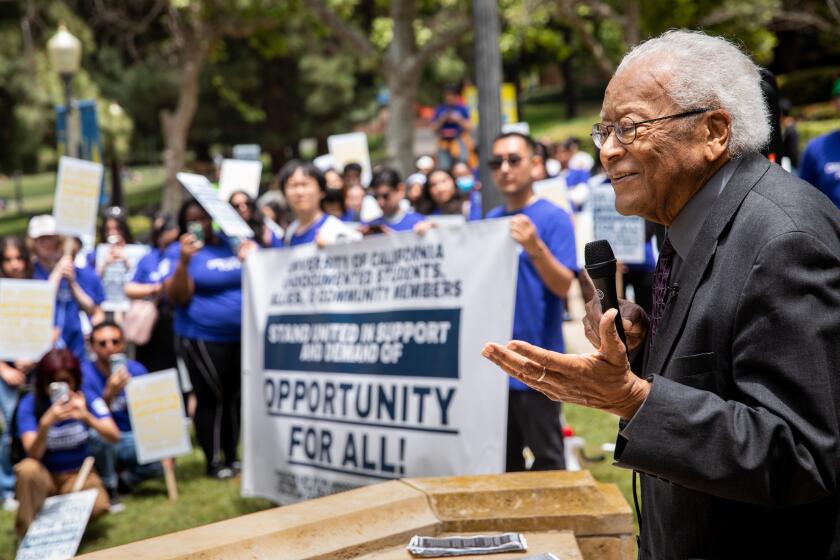Horrific social media posts about the Israel-Hamas war show how being online ruins independent thinking. Can we fix it?

- Share via
Americans seem to be losing the ability to think and behave freely.
In the days since the Israel-Hamas war began, our collective loss of these things is conspicuous on social media, where many of us are recycling the one-sided takes of bots. Many reflexively vilify the Israelis or the Palestinians, then attack peers who won’t join in. Some even cheer the carnage of the perceived Other.
Opinion Columnist
Jean Guerrero
Jean Guerrero is the author, most recently, of “Hatemonger: Stephen Miller, Donald Trump and the White Nationalist Agenda.”
There are people who are resisting the pack mentality, devastated by the slaughter of civilians, no matter their nationality, and willing to talk with people from diverse backgrounds. But they seem to be the exception, certainly on social media, where half of Americans get their news.
How did so many of us come to resemble automatons?
In her new book, “Doppelganger,” Naomi Klein explores why we’re losing our capacity to think independently: becoming “individuals not guided by legible principles or beliefs, but acting as members of groups playing yin to the other’s yang — well versus weak; awake versus sheep; righteous versus depraved. Binaries where thinking once lived.”
James Lawson, the godfather of the civil rights movement, is turning 95. A new generation of leaders in Los Angeles and beyond aspire to carry on his legacy.
Klein’s theory is that many of our actions no longer reflect careful deliberation, but the prodding of what she calls our digital doubles, forged from the data generated by every click, view and search, which expose our proclivities and vulnerabilities. “Every data point scraped from our online life makes our double more vivid, more complex, more able to nudge our behavior in the real world,” she writes.
These digital doubles allow advertisers and others to target us with content that preys on our fantasies and fears. If we’re depressed or struggling financially, a company might use knowledge of our instability to sell us overpriced products. A campaign might bombard us with content that dissuades us from voting.
As tech companies compile the data that form our digital doubles, selling those data to businesses and other entities to be used to influence us, our actions and beliefs are less our own, though we may not know it. The more we exist online, the more privacy and autonomy we lose.
Guerrero: Is polarization a problem, or just a reality because the far right has lost its mind?
Engaging with the other side is the only hope for pulling Americans out of the orbit of Marjorie Taylor Greene and her ilk.
Jaron Lanier, a pioneer of virtual reality, has been sounding the alarm about the loss of independent thinking to digital manipulation for years, making his argument in his books “Ten Arguments for Deleting Your Social Media Accounts Right Now” and “You Are Not a Gadget.”
Lanier, however, doesn’t frame the problem as a crisis brought on by a lack of privacy online, but a lack of connection among people. For him, the problem is that algorithms use personal data for mass behavior modification, which causes us to become disconnected from reality and one another. “The algorithms benefit from you being connected to the algorithm,” he said. “They don’t benefit from you being connected to other people.”
In the years since Lanier began warning of these dangers, things have gotten both better and worse in his view. Worse because Elon Musk turned Twitter into X, a digital hub of extremism and disinformation, including about the Israel-Hamas war. Worse because the Chinese company TikTok, which is particularly addictive, has become a preferred social media platform for teens, who are easily subject to manipulation.
The older children are when they get their first smartphone, the better their mental health later in life. That’s little consolation to teens feeling left out when all their friends are connected.
On the bright side, California passed landmark privacy legislation to protect digital users. And this month, Gov. Gavin Newsom signed the Delete Act, empowering people to compel data brokers to delete their personal information with just one request. The Hollywood writers’ strike was also a victory for people, limiting the use of AI to replace some human work.
But there’s still a lot of work to be done. For starters, the nation needs a federal privacy law. Consumers should demand that Congress support the American Data Privacy and Protection Act, which stalled last year because Republicans wanted it to preempt state laws. Preemption would slow progress on privacy rights because Congress takes ages to update its laws; states are more nimble.
Daniel Solove, who teaches technology law at George Washington University, argues that existing laws need updates because they largely allow companies to do “whatever the hell they want as long as they say it in their privacy notice.”
Solove, who has written about a concept he calls “murky consent,” observes that most people don’t have time to read privacy notices. And even if you do, “you’re not going to know enough from the privacy notice to make any meaningful decision at all.”
Because of how tricky this is, we need a federal regulator focused on the practices of Big Tech. That’s just what Sen. Elizabeth Warren (D-Mass.) wants to create with the Digital Consumer Protection Commission Act, introduced with Sen. Lindsey Graham (R-S.C.). “Big Tech giants exploit people’s data, invade Americans’ privacy and crush competition,” Warren told Vox last month. “We cannot let a handful of unelected Big Tech billionaires govern our lives and govern our democracy.”
Her bill is another important step. But it’s not enough. We need to change how we relate to privacy amid the rise of surveillance capitalism.
The more Big Tech is allowed to extract our data from us, the more vulnerable we are as citizens. In “Privacy Is Power,” Carissa Véliz argues that privacy is central to personal freedom and a free society. “We need it to be autonomous individuals, and for democracies to function well we need citizens to be autonomous,” she writes.
We have a choice to make: pressure leaders to protect our privacy or lose something even greater.
More to Read
A cure for the common opinion
Get thought-provoking perspectives with our weekly newsletter.
You may occasionally receive promotional content from the Los Angeles Times.














